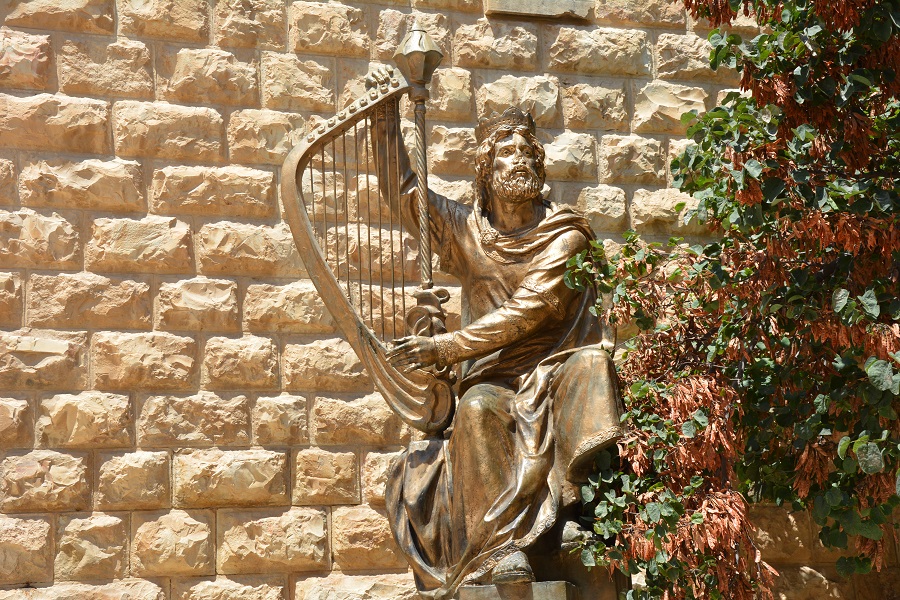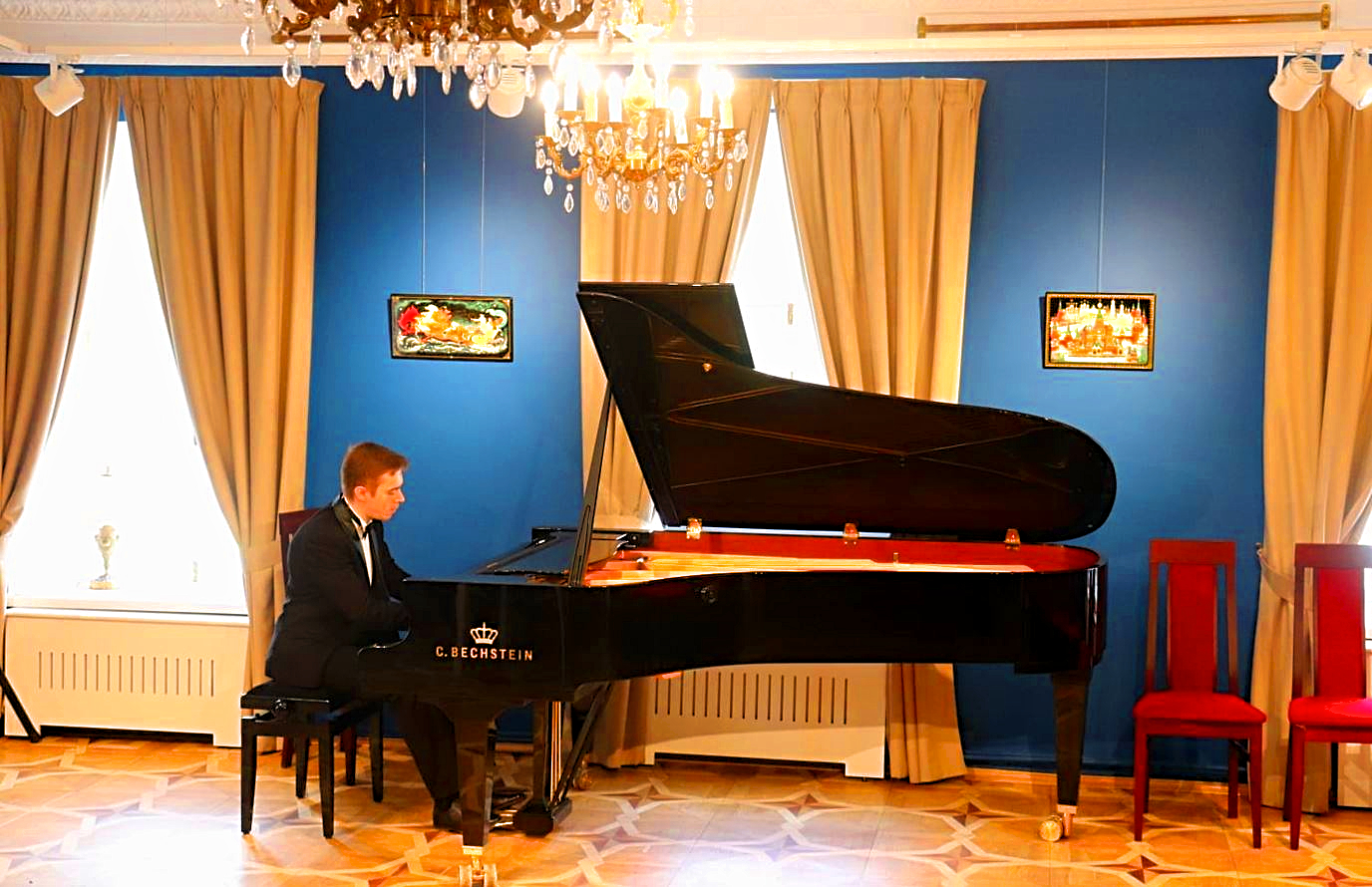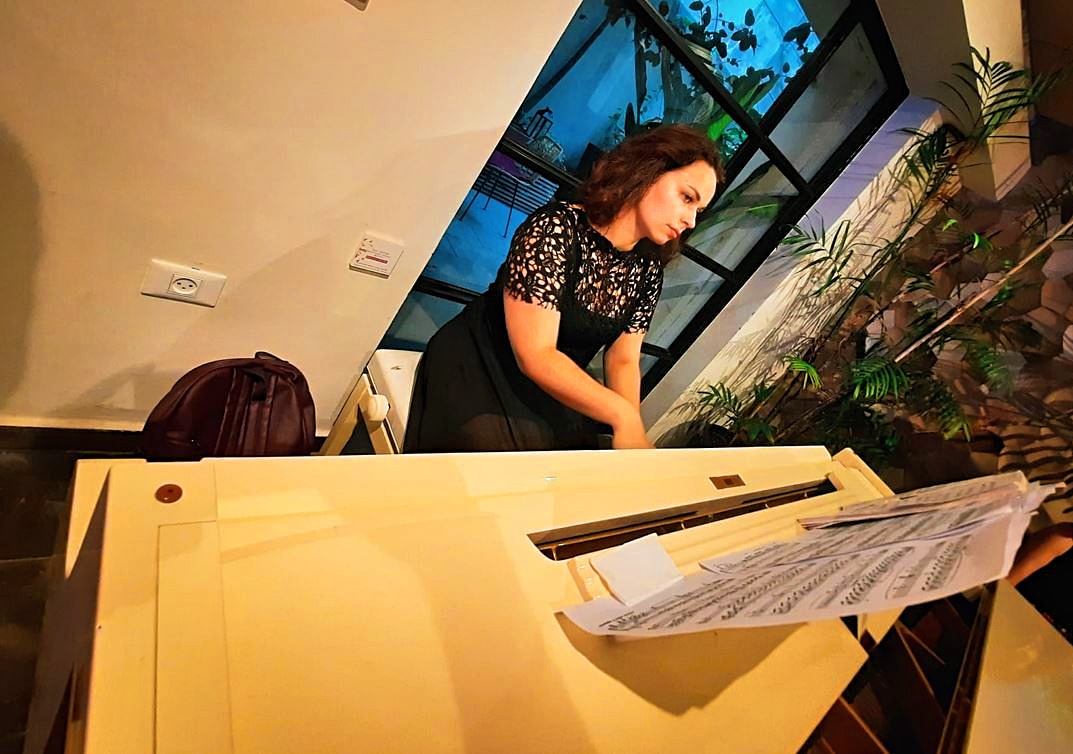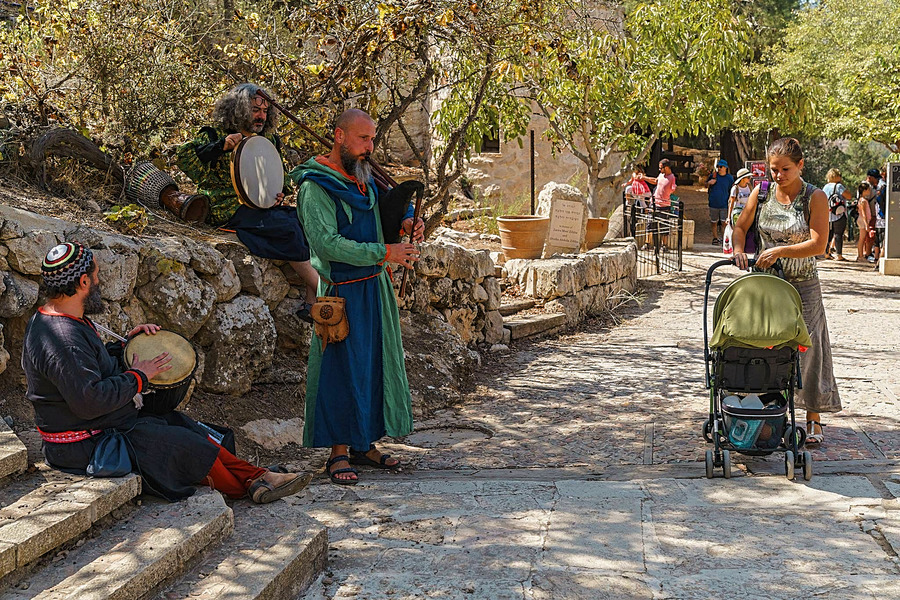Music of Israel
Israel is a long way from its 100th birthday but in the last century, all kinds of influences have combined to create a very diverse and unique musical culture in the country. From enthusiastic amateur singers, cabarets, and small choral societies in the 1920s, to the establishment of the Israeli Philharmonic after the state was created, stretching onto the 1990s, when almost a million Russians emigrated to Israel, many of them excellent musicians, the music scene has been popular!
A musician playing bass guitar at a concert, Israel. Photo by Anton Mislawsky on Unsplash
Today, Israeli opera, jazz, and pop music are also forces to be reckoned with, so if you’re traveling to Israel, you can be sure of finding a ticket to something very exciting. Moreover, not just Tel Aviv, Jerusalem, and Haifa but many other cities and small towns sponsor their own choirs and hold annual music festivals in Israel.
Whether it’s a small recital, a full-scale symphony performance, Madonna performing in Yarkon Park, an Israeli folk singer giving a concert in the restored Roman theater at Caesarea, you can be sure of finding incredible musical performances the length and breadth of the country.
What Defines Israeli Music?
So, what are the characteristics of Israeli music? That’s a hard question to answer! There are all kinds of global influences, for sure - including Russian folk songs, Eastern European Klezmer band traditions, Yemenite ballads, Hasidic melodies, and, of course, the enormous influence that Arabic music has had. And that’s before you even begin to factor in Greek, Ethiopian, central European, and Latin American influences.
Of course, that’s to be expected - after all, if Israel is the ultimate melting pot, then why should its musical heritage be any different? Since immigrants began arriving in the Holy Land at the turn of the 20th century, they have been looking for ways not just to express themselves but also to define the ‘national spirit’. This has resulted in a wealth of talent - whether it’s classical, jazz, folk ballads, or pop and rock, the music scene in Israel is incredibly diverse.
Beautiful old violin on a red tablecloth, Israel. Photo by Leonid Portnoy on Unsplash
National Musical Instruments of Israel:
The history of musical instruments in Israel is a long and rich one. It is fair to say that music played an integral part in the local culture - cymbals and tambourines were used to celebrate joyful occasions, lyres and harps were played at royal concerts, and trumpets were sounded to remind people of momentous events and to celebrate victories.
Several musical instruments in ancient Israel are specifically mentioned in the Bible, whilst others are referenced in historical manuscripts. These include: kinnor - this ancient Jewish lyre is also known as King David’s harp since it is the instrument the famous Israelite played. It is Israel’s national instrument and a spiritual instrument for Christians.
The Roman Jewish historian Josephus describes the kinnor as having 10 strings, constructed out of a sheep's small intestine, and played with a plectrum (pick). However, the book of Samuel in the Hebrew Bible states that David played the kinnor "with his hand".
Shofar - shaped like a horn, this Hebrew trumpet was blown to summon people to prayer, war, or solemn ceremonies. It was also blown by the Cohen priests to mark the beginning of the Jewish New Year and the tradition continues in synagogues around the world today, each Rosh HaShanah.

David Playing the Harp Before Saul, Jerusalem, Israel. Photo credit: © Shutterstock
The shofar is mentioned several times in the Bible. These include the book of Joshua, where the blowing of the shofar was part of the battle to capture the city of Jericho, and in the book of Judges, where it was sounded by Gideon and his warriors in order to terrify the opposing army. Shofars are made out of ram’s horns and, indeed, make a powerful sound (almost like a blast) when blown.Oud - this stringed musical instrument was played regularly in medieval times and is still popular today, in Islamic culture. It is the parent of the European lute, usually with 11 strings grouped in six courses. It has a deep, pear-shaped body, a relatively short neck, and a fretless fingerboard. In Arabic, it means something close to ‘wood stick’ or ‘flexible stick’. It is still played today at traditional music concerts in Israel and the Middle East.
Kanun - this stringed instrument can be played either solo or as part of an ensemble and its origins go back to before the birth of Christ. Also part of the lute family. Arabic kanuns are usually made with five skin insets that support a single long bridge, resting on five arching pillars. They have ornamental sound holes called kafes and are played sitting or squatting, plucking the strings with tortoiseshell picks.
Darbuka - this goblet-shaped percussion instrument is still widely played in Islamic classical and folk music throughout North Africa, Central Asia, and the Middle East. Lutes, flutes, and bells were also commonly used in biblical times. Daniel, the prophet of Jehovah, wrote of the orchestra of King Nebuchadnezzar - their instruments actually included the pipe, the zither, and the bagpipe!
Oud, the traditional musical instrument of Israel, similar to modern lutes. Photo by Youssef Abdelwahab on Unsplash
The History of Music in IsraelMusic has always been an integral part of the country, beginning with the pioneers who arrived from Russia and Europe. As they built the land, they were encouraged to sing - and in groups. Public ‘sing-a-longs were a popular pastime, especially in the kibbutz, because many of the leaders of the day thought it would promote the ‘national spirit.’
Today, Israelis young and old still love to sing these songs - particularly out on hikes and sitting around bonfires. This mixture of patriotism and nostalgia for the early days of the state is something many visitors to the country really do find fascinating and touching.
Musical cabarets in the 1920s and Aliyah in the 1930s
Cabarets became popular in British Mandate Palestine in the 1920s and were responsible for the fame of quite a few artists, including Shoshana Damari (a famous Yemenite singer who began her career at ‘Li La Lo’ in Tel Aviv - a cabaret that revolved around drama and satire.
By the 1930s, the political tide was turning and the rise of fascism meant Jews were no longer safe in Germany and wider Europe. Many fled and some of them arrived in Palestine - and the country gained an orchestra as a result. In 1936, the Israeli Palestine Philharmonic made its debut, under the leadership of Arthur Toscanini. (Shortly after, a radio orchestra was set up (today it is known as the Jerusalem Symphony Orchestra) and the concerts it broadcasted were soon attracting tens of thousands of listeners).
Since 1948, the Israeli Philharmonic has gone from strength to strength and is now recognized on the global stage. It even rises above politics from time to time - in the 1980s it performed on the Israel-Lebanon border, playing to audiences on both sides of the fence, who had come to enjoy the concert!

Evgeny Zlatin, an Israeli pianist, Jerusalem Academy of Music. Сourtesy photo
The Israeli Conservatory of Music
One of the oldest and most prestigious institutions in Israel, this Tel Aviv Conservatory was founded in 1943 and serves today as a center to nurture the talent of young musicians in Israel. It boasts a music library, a state-of-the-art concert hall, and a separate wing for opera and chamber music classes.
The Jerusalem Academy of Music and Dance
The Conservatory is one of three institutions that make up the Jerusalem Academy of Music and Dance. It offers all kinds of educational programs in music for students from preschool through to graduate level in Israel.
What Kind of Music Will I Hear in Israel?
If you travel around Israel, you’ll hear all types of music - in the open-air markets, in restaurants, on the local and intercity buses (Israeli drivers love to sing and play music whilst they’re on the road!), in religious services, national ceremonies and just on the streets in different neighborhoods.
These musical genres range from ‘Eastern’ (meaning that which originated in Arab-speaking societies), Hasidic (religious music which has its origins in Eastern Europe, especially Poland), Iraqi Jewish music, Ladino songs (which began in Spanish-speaking societies), Yiddish (secular in origin, and often part of ‘Klezmer’ bands) Israeli-Arab (with an emphasis on long, melodic notes) and modern-day Israeli pop.

Daria Zlatina, an Israeli pianist, Jerusalem Academy of Music. Сourtesy photo
Mizrahi - in Hebrew ‘mizrach’ means ‘east’ and this kind, of music, is associated with Sephardic Jews. The movement began in the 1950s, with performances by locals in neighborhoods in which Jews from Arab countries mainly lived. They performed songs in Hebrew but in an Arabic style (on traditional instruments). By the 1970s, Mizrahi musicians like Avihu Medina and Zohar Argov had become very popular and, today, Mizrahi pop is the most common and prominent form of pop music in Israel.Hasidic and Orthodox Jewish music - the Hasidic movement began in the second half of the 18th century in Eastern Europe and placed a great emphasis on expressing joy through song and dance. Today, Hasidic music can be heard at simchas (celebrations) such as weddings and bat mitzvahs, as well as at the Rabbi’s table {the ‘tisch’).
Hasidic music has a number of genres including niggunim - religious Jewish songs (or tune) sung in groups, often quite repetitive, using sounds such as “lai, lai, lai”, “bim-bim-bam” or “ai, ai, ai” instead of actual lyrics. Some can be woeful and others very joyful. Niggunim are central to worship in Hasidic Jews life, and a soulful reflection of how mystical intense prayer can be.
Iraqi Jewish music in Israel - in the 1930s, Iraqi musical groups were almost always Jewish! Today, in Israel, this continues in the form of beautiful Arab music, including love songs, folk chants, and traditional music.
Tamar Eisenman, Israeli rock and folk singer and songwriter. Photo credit: © Dmitry Mishin
Ladino music in Israel - Ladino was the language of the Spanish-speaking Jews, throughout medieval times, with music in the form of ballads sung by women in a dramatic style, either in private or during celebrations.Yiddish music in Israel - this kind of music is sung in the language of the Jews from the tiny villages of Eastern Europe - Yiddish, It includes songs from Yiddish theatre, Klezmer bands, and songs modeled on French melodies and German lieder.
Klezmer dance tunes, ritual melodies, and virtuosic improvisations were often played at weddings. Today, Klezmer is making somewhat of a comeback and, in fact, an international Klezmer festival is due to be held in August 2022 in Jerusalem, featuring musicians from around the globe.
Israeli Arab music - these melodious songs have become increasingly popular in the country in the last 20 years. One of the most popular on the scene is Ziv Yehezkel, who seems to have captured the hearts of Arabs in Israel. Now, after Israel’s signing of the Abraham Accords with Bahrain and the UAE, it’s quite likely to mean new inspiration for Arab music singers in Israel.
Sarit Hadad, an Israeli mizrahi singer. Photo credit: © Dmitry Mishin
Secular music in Israel - in recent years, many modern artists and pop singers from Israel have broken onto the scene, not just within the country but the wider international stage. Some of the more famous include: Etti Ankri - Born of Tunisian parents, this singer has become famous for her moving and emotional songs and is also called the ’contemporary voice of Israel’.
Ofra Haza - an icon in Israel and known in the west as ‘the Israeli Madonna’ Haza became famous for her Yemenite songs and after representing Israel in the Eurovision Song Contest, her song ‘Im Nin'Alu’ itself became a Top 20 hit in the UK.
Dana International - after winning the Eurovision Song Contest in 1988 with her hit song ‘Diva’, this once Drag Queen and proud transexual singer shot to fame and her songs were soon being played at every dance venue in Israel and every gay bar across Tel Aviv!
Netta Barzilai - well known simply as ‘ Netta’ this singer shot to fame after winning an Israeli tv competition - her prize was to compete at the Eurovision Song Contest in Lisbon. There, in May 2018, she won the contest with her song ‘Toy.’

Musicians performing at Jerusalem Knights Festival, Israel. Photo credit: © Dmitry Mishin
 Login / Register
Login / Register
 Contact Us
Contact Us
 Certificate of Excellence
Certificate of Excellence Guaranteed Departure
Guaranteed Departure Low Prices Guaranteed
Low Prices Guaranteed 24/7 Support
24/7 Support




